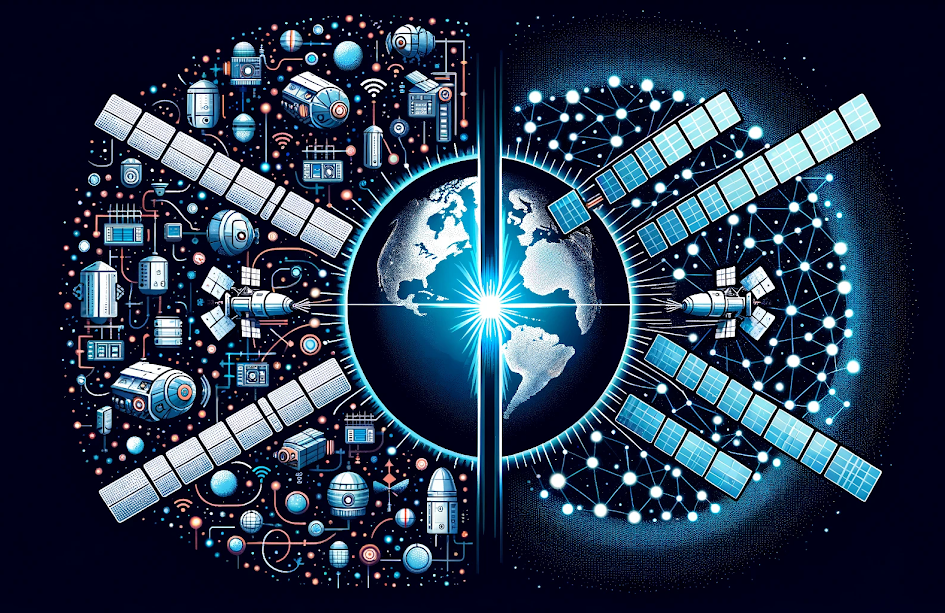A recent publication in Nature Portfolio explores using AI-based satellites to enhance global connectivity. Tenchijin, a startup based in Japan, has recently started to harness deep learning (DL) to inform the most suitable use of land decisions and increase the speed and reliability of broadband satellite Internet. This article discusses the growing role of artificial intelligence (AI) in improving global connectivity and accurately determining the best use of land, specifically focusing on the solution developed by Tenchijin.
 Study: AI-operated Satellites to Boost Global Connectivity and Improve Land Use. Image credit: Generated using DALL.E.3
Study: AI-operated Satellites to Boost Global Connectivity and Improve Land Use. Image credit: Generated using DALL.E.3
Background
Satellites orbiting the Earth have witnessed a rapid increase in the last few decades, with the number of satellites increasing from 1000 in 2006 to approximately 7000 in 2022, primarily due to the growth of broadband internet services through satellites for underserved markets.
A substantial share of the internet traffic is typically routed through the optical cables laid on the ocean floor. However, this existing infrastructure has not fulfilled the needs of several most isolated and poorest nations in the world. Moreover, internet traffic through optical cables can face disruptions for a significant period during natural disasters. Similarly, satellites rely on ground stations for relaying data. However, the ground stations are not always reliable.
Although the latest generation of satellite internet services is using optical laser communications and high-frequency Ka radio band owing to congestion in the conventional frequency bands, the clouds and rain above the ground stations can obstruct signals in these bands, leading to slow communication.
Role of AI in improving connectivity
Tenchijin, Inc., an award-winning Earth-imaging Japan Aerospace Exploration Agency (JAXA) startup based in Japan and founded in 2019 to harness satellites and AI, has focused on addressing the existing issues with satellite internet through more efficient utilization of ground stations.
The startup offers business solutions from its land evaluation system, which provides a comprehensive evaluation of land using high-resolution, high-precision, earth observation satellite big data. In 2022, JAXA invested in Tenchijin to help the startup develop the COMPASS service.
Tenchijin aims to optimize global broadband satellite communications with satellite and land data and AI. The solution developed by Tenchijin addresses the primary cause of the issues with satellite internet by characterizing the impact of weather, specifically rain, on the communication between the ground station and the satellite.
Tenchijin’s AI system can predict the most suitable ground stations for satellite communications accurately based on the local conditions. The system contains a weather prediction AI to identify the best ground sites by actively avoiding clouds and rain. The solution can integrate different weather data, including radar images and precipitation amounts, seamlessly to forecast the ground station weather conditions. Tenchijin utilizes satellite and surface observation data for DL models that generate precise cloud and precipitation forecasts and the predicted attenuation of waves.
Thus, the solution can be extremely beneficial for countries lacking efficient optical fiber infrastructure and fulfill the communication needs of isolated communities. For instance, satellite communication played a critical role in Guam when the optical fiber links in the region faced disruptions for a month after a typhoon.
The startup has planned to verify the solution with the launch of JAXA’s Engineering Test Satellite-9 (ETS-9) in 2025, and the product will be deployed to provide ground station weather prediction data to ground station operators and satellite operators.
This demonstration satellite has been designed for advancing the next-generation geostationary communications. The service will be provided through a web application programming interface (API) that connects Tenchijin’s analysis to ground station operating systems and satellites owned by their operators.
Other applications of COMPASS
In the renewable energy sector, the competition to secure land suitable for developing renewable energy projects is increasing globally. Tenchijin COMPASS can facilitate faster decision-making by comprehensively analyzing and using different information sources, such as aerial and satellite imagery, weather information, and map data.
For instance, COMPASS has utilized forest, regulatory, wind, and radiation data to determine the most suitable locations for European wind and solar farms. In agriculture, high temperatures due to global warming have adversely affected crop production.
Tenchijin COMPASS can provide data-driven cultivation land management and selection services for vegetables, fruit trees, and rice based on client requests, which eliminates the need for excessive labor or intuition. For instance, COMPASS has advised fruit growers on the best locations in Japan for kiwi fruit.
In city planning, COMPASS has analyzed data on soil, moisture, and temperature to advise municipalities in Japan on the locations where water pipes have a higher possibility of leaking, which improves maintenance efficiency.